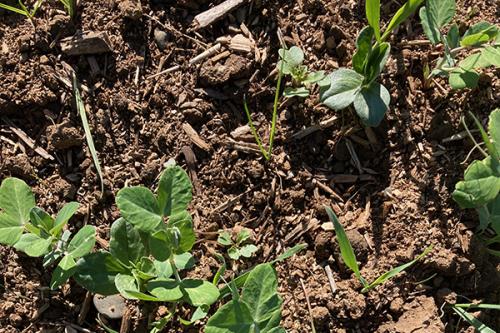
Farm Information
County: Yolo
Location: Esparto, Capay Valley
Slope: Mild slope
Irrigation system: Suspended micro-sprinklers
Soil type: Loam
Soil detail: Hillgate loam, with some Capay clay
Special farming challenges: n/a
- Cropping Systems Information
- Crop: almonds
Acres of orchard or vineyard: 12.5Other crops: No
Acres of other crops: n/a
Organic management: Yes
Certifications: Yolo County Certified Organic
Certifications notes: Homegrown Heroes, Real Organic Project, Bee Friendly Farming
Where using cover crops: All of the almond plantings. - Grower Experience, Farm Priorities, and Cover Cropping Goals
- When started farming (yr): 2009
Farm priorities: Organic. 2% almond growers in the world are organic. Microbial activity in the soil. Organic matter, food for microbes, healthy fertile soils.
Years growing orchard or vineyard crop: 12 years
Years growing cover crops: 7 years
Initial transition to cover cropping: Planted whole orchard in a broadcast method. May have started with vetch only.
Goals and benefits: Nitrogen supplement, soil improvement, pollinator support, water infiltration/retention
Benefits description: N fixation, pollination, erosion control, soil organic matter/soil health, water holding capacity, early orchard entry
Change in goals over time: The reasons have increased. Soil erosion, infiltration, water holding capacity, feeding microbes.
Reasons: Still broadcast. Added other seeds, each year can be different, some things may do better than others. E.g, radish helps aerate soil, as does mustard, plus provides a lot of biomass. - Cover Crop Details, Planting and Management Methods
-
Block described here: Almonds
Current cover crops: Legumes, grasses
Species and mixes: Vetch, tritcale, Project ApisM clover mix (17% balsana clover, 25% persian clover, 8% Hykon rose clover, 10% crimson clover, 15% medic, 25% berseem clover)
Planting method: Broadcast seed
Planting date (2020): January
Was that optimal? No. Prior October would have been better but the fall was very dry.
Pre-plant soil prep: Low-till, 1” rototill prior to planting, chicken manure to integrate, helps with weed control, providing good seed bed.
Planting equipment: Broadcast. PTO broadcast spreader
Seeding rate: 160lb/ac.
Seeding depth: Rough till, leave seed, no need for harrow.
Did it germinate well? No
Additional management and advice: Mows to reduce competition, do sanitation, and reduce rodents. Experimenting with running sheep year round except for the pre-harvest interval. Does not harvest off the ground. - Cover Crop Termination Methods and Biomass Management
-
Termination method: Mow
Termination equipment and process: Mow 3-4x throughout season, although 2021 did not require much due to low germination. They are also experimenting with keeping sheep in year round, aside from the pre-harvest interval.
Termination date: May 1
Was it optimal? No, not enough rain
Biomass management: n/a - Cover Cropping Challenges and Strategies to Address Them
- Challenges: Establishment difficulties, Orchard floor residue at harvest
Challenges description: Rainfed, so difficult to get a good stand established with unpredictable rainfall
Strategies to address challenges: Harvests almonds up off the ground, with an old prune harvester into a catch frame, so orchard floor residue is not a problem.
Was the cover crop worth it? Yes, marginally, but hard to know without a control and testing.
Least successful past cover crops: Clover gets too much competition from grassy weeds. Usually better with early planting. If we had rain in October, it could be okay, as he relies on rain.
